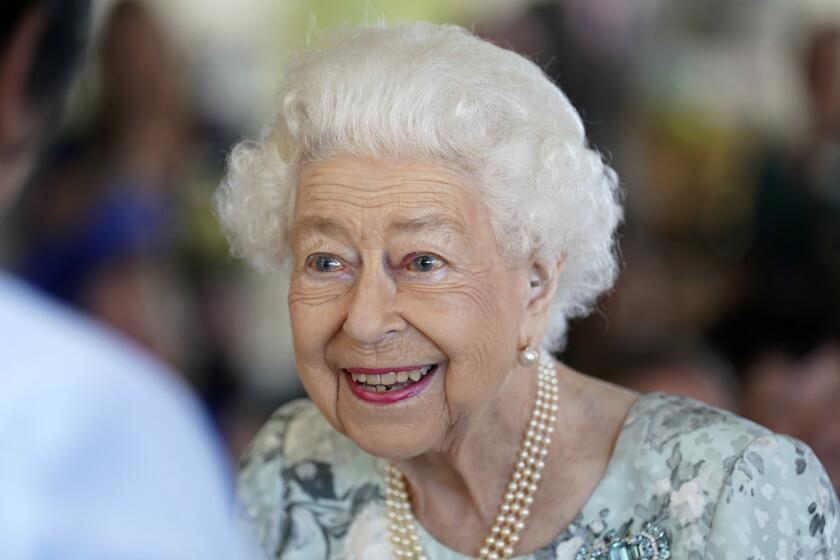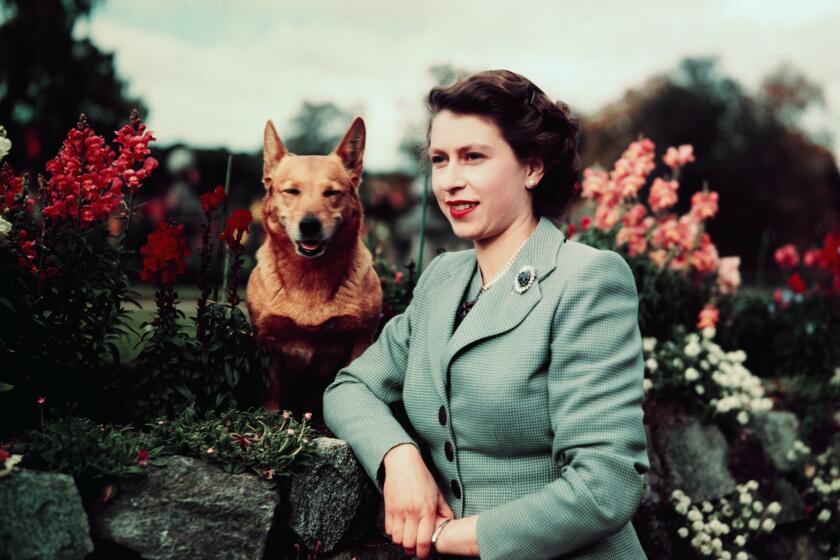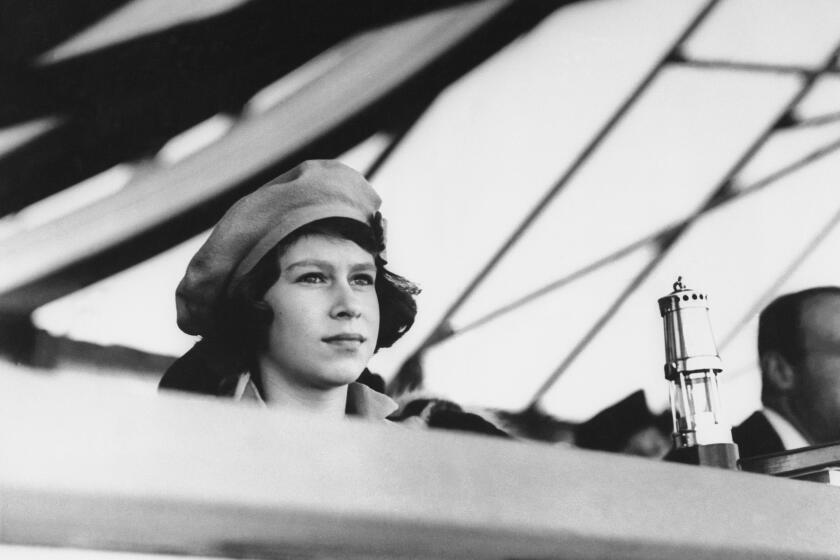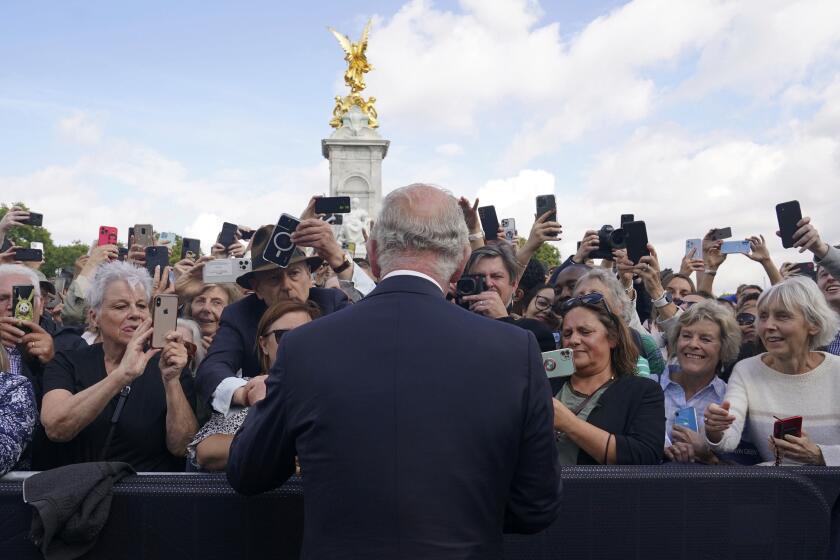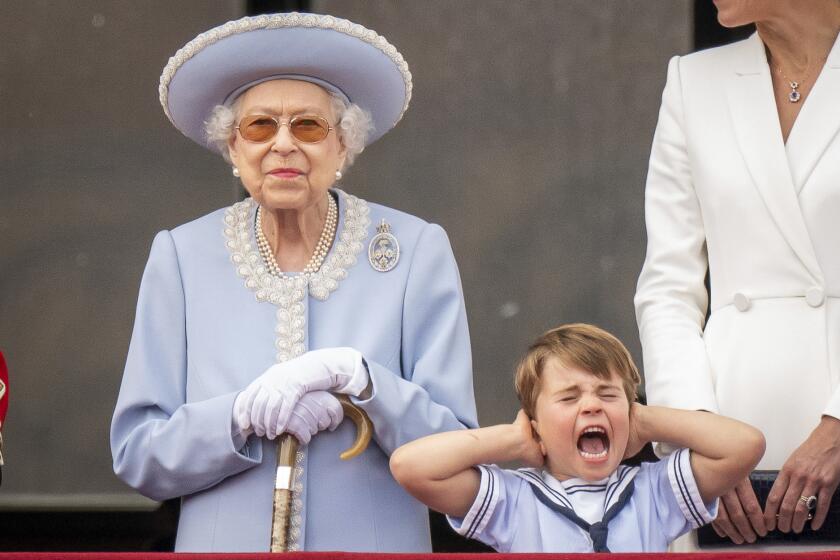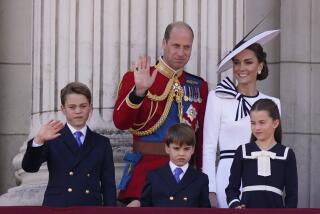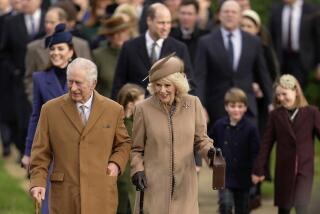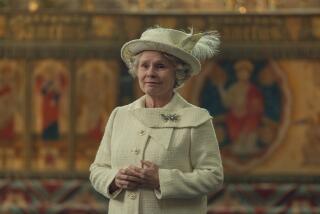Charles vows to reign with ‘respect and love’ as Britain mourns the queen

Bells toll across Britain and mourners flock to palace gates to honor Queen Elizabeth II as the country prepares for a new age under King Charles III.
- Share via
LONDON — Church bells pealed. Gun salutes boomed at parks and castles. Mourners lined up at monuments and pubs to pay homage to a woman whose name was for so long synonymous with their nation.
With some stiff upper lips and others that dared to quiver, Britons soldiered on Friday with the process of bidding goodbye to Queen Elizabeth II — the only monarch most of them have ever known — and adjusting to life under the reign of a new sovereign, her eldest son, King Charles III.
“It is simply odd,” said Samuel Mackesy, a gift store worker in central London who on Friday was scrambling to order Elizabeth memorabilia while reflecting on the loss of someone he called an “icon.”
“Of course I did not know her,” he said. “Few did. But she was something that you could hold onto. She was there when I was born in 1960, and, if I really think of it, it felt sometimes [like] I would die before she did.”
The U.K. was somber as it entered a 10-day period of national mourning for the queen, who died Thursday at 96 as Britain’s longest-lived and longest-reigning monarch. A country that in some ways has grown accustomed to political, social and cultural upheaval was now forced to confront change in one of the few areas of national life that had long remained constant.
On Friday evening, Charles strove to assure all those who held his mother in such esteem that he would carry on his mother’s tradition of service to her people.
Queen Elizabeth II’s 70-year reign was so long that most of Britain’s 68 million people have known no other sovereign.
“Wherever you may live in the United Kingdom, or in the realms and territories across the world, and whatever may be your background or beliefs, I shall endeavor to serve you with loyalty, respect and love, as I have throughout my life,” Charles said in his first national address as the new king of Britain — and of other nations, such as Australia and Canada — that recognize the British monarch as their head of state.
He expressed profound sorrow over the death of Elizabeth, for whom “affection, admiration and respect” from her subjects were “the hallmark of her reign.”
“As every member of my family can testify, she combined these qualities with warmth, humor and an unerring ability always to see the best in people,” Charles, who at 73 is the oldest-ever new British monarch, said, adding: “To my darling mama, as you begin your last, great journey to join my dear late papa, I want simply to say this: ‘Thank you, thank you for your love and devotion to our family and to the family of nations you have served so diligently all these years. May flights of angels sing thee to thy rest.’”
Elizabeth died Thursday at Balmoral Castle, her summer home in Scotland, barely 48 hours after she appointed a new prime minister, Liz Truss, the 15th premier of her 70-year reign.
Photos of Queen Elizabeth II’s life and reign as British monarch.
Her family had rushed to be at her side. On Friday, Charles returned to London, where outside Buckingham Palace he spent several minutes shaking hands and greeting well-wishers who gathered by the thousands to see their new monarch. “Well done, Charlie!” cried one. Another kissed him.
Charles formally becomes king Saturday; his wife, Camilla, will take the title of queen consort. While he is not the political leader of the nation, he assumes a role as its living symbol and its unifier, beyond party politics.
If he lives to his mother’s age, Charles is likely to outlast multiple prime ministers, though, at 73, he will have a shorter reign. It begins in an uncertain time, as everyday Britons struggle with skyrocketing energy costs and inflation that have put the nation on the verge of a recession. The new government must also grapple with the long-term consequences of Britain’s withdrawal from the European Union.
He will also inherit a crown with diminishing reach, as the nations that recognize its authority shrink in number — now 15. Last year, Barbados decided no longer to have the British monarch as its head of state. Other nations, including Jamaica, are considering similar moves.
From her ambulance service during World War II to being the subject of a Beatles song, Queen Elizabeth II lived a remarkable, and long, life.
On Friday, the mood in London was one of mourning mixed with questions the queen’s death has brought up about the role of the British royal family in the U.K. and abroad.
Crowds lined up outside the City of London tourist office for one of the 2,000 tickets for members of the public to attend an evening service of “prayer and reflection” at nearby St. Paul’s Cathedral, attended by Truss and other dignitaries and beamed around the world. The group of hopeful attendees included tourists as well as die-hard local fans of the monarchy.
Sumeeta Patel said she first learned of the queen as a girl in India when Elizabeth visited in 1961. The queen, along with her late husband, Prince Philip, that year toured Mumbai, Kolkata, Chennai and New Delhi, where they participated in a tribute to Indian civil rights leader Mahatma Gandhi at the Raj Ghat memorial.
“I was too little to know a lot about it, but I remember my parents talking about it when we lived in Delhi. It was a big event,” said Patel, who immigrated to London in the 1980s. “Anyone who is desi knows this woman very well,” she said, using a shorthand term for South Asians.
Royal mourning will temporarily turn attention away from Britain’s many pressing problems and how a new prime minister will tackle them. Then what?
“I just happened to be visiting, so I thought why not try to go to this?” said Ashley Julian, an American from Maryland who had landed in London for vacation Wednesday and was at the end of the line. “She’s the original world celebrity. It can’t be a worse wait than trying to see the palace.”
The service concluded with the first formal public singing of the national anthem in its new iteration as “God Save the King” instead of “God Save the Queen.”
While the government released guidelines on Thursday saying businesses were under “no obligation” to close in deference to the queen’s death, many did. Selfridges, a department store chain, said it would temporarily shutter, as did the Legoland theme park. The Bank of England delayed a scheduled meeting to discuss interest rate hikes, and parliamentary business was suspended for 10 days.
Sporting and cultural events were canceled, including the Last Night of the Proms — the finale of a festival of classical music that traditionally ends with rousing renditions of “Rule Britannia” and other patriotic songs.
Queen Elizabeth’s whole life was based on duty and ritual. That didn’t stop her from taking a moment to chat up her antic great-grandson during her Platinum Jubilee.
“Whether you like the queen or king or not, you cannot avoid them today,” said Juan Lopez, a medical billing worker who waited for a train at the Mile End subway station in East London during the morning commute. “It’s London. Something always happens here. And for however long now, that something is the queen’s death. That is London now.”
Elizabeth’s state funeral is expected later this month, though an exact date is not yet set. It will take place at Westminster Abbey, the traditional site of coronations, weddings and funerals for the royal family. The church is a primary site of the Church of England, part of the global Anglican Communion, which includes the Episcopal Church in the United States.
In a statement, Archbishop of Canterbury Justin Welby, head of the communion, paid tribute to Elizabeth. The British monarch is the nominal chief of the Church of England.
“The queen constantly showed us the meaning of life — she was joyful, she was humorous, her life was full. But she never, even in bad moments, lost hope,” Welby said.
“It feels as though for so many people around the world, especially in the U.K., that a part of our lives we’ve taken for granted as being permanent is no longer there,” he said. “And in that sense there is an enormous shift in the world around us, in how we see it and how we understand ourselves.”
More to Read
Sign up for Essential California
The most important California stories and recommendations in your inbox every morning.
You may occasionally receive promotional content from the Los Angeles Times.

